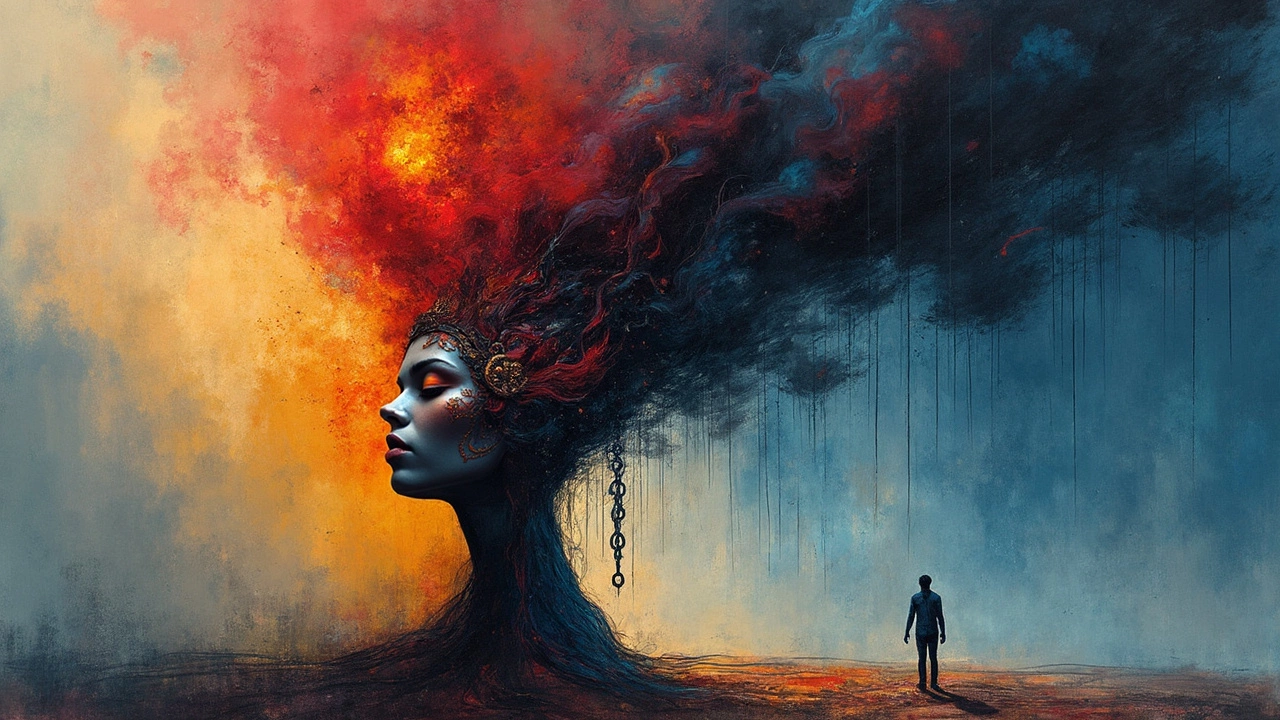Severe depression, often termed as major depressive disorder, pulls a shadow over life that's hard to shake. It's not just feeling sad occasionally; it's a relentless storm that affects every aspect of life. Imagine waking up, and it's like a heavy fog you can't see through. Doesn't matter who you are, depression doesn't discriminate. It can hit anyone at any time.
Now, why does depression stand out compared to other mental health conditions? It's because of its pervasive nature. It doesn't just stay in one corner of your mind; it bleeds into how you eat, sleep, work, or engage in social activities. For many, it's like carrying an invisible weight all day long.
Real talk: Depression is demanding because it changes your brain chemistry, shifting how you feel pleasure and emotion. Over time, the simple joys you once loved seem to disappear. It isolates you, making connections with others hard to maintain. It's no wonder relationships often take a hit, with miscommunications and misunderstandings galore.
- The Pervasive Nature of Depression
- Impact on Daily Life
- Comparisons with Other Mental Illnesses
- The Role of Therapy in Management
- Coping Strategies and Support
The Pervasive Nature of Depression
When we talk about depression, we're not just talking about feeling blue now and then. We're looking at a condition that really saturates every part of life. You know how it feels when you can't shake a bad dream? Depression is like that, but it sticks around when you're awake, too.
Here's the deal: depression doesn't just affect how you feel. It gets into your brain, changing the way you perceive everything around you. Overwhelming fatigue, anxiety, and irritability become daily companions. It clouds your judgement and slows down your ability to think clearly or make decisions. It's like driving through thick fog - exhausting and frustrating. This is why severe depression is often viewed as the most damaging of mental illnesses.
Beyond Just Emotional
Depression hits hard beyond just emotions. Physically, it throws you into a loop where food loses its taste, sleep becomes elusive, or worse, all you want to do is sleep. According to studies, around 70% of people with severe depression report changes in their eating habits - either overeating or losing their appetite altogether.
Socially, it can make you want to withdraw from friends and family more often than not. Social events feel daunting. You might cancel plans or dodge calls because it's just too much effort to engage.
The Mind-Body Connection
There's also a serious toll on the body. Depression can lead to headaches, chronic pain, and even digestive problems. A real kicker – it can weaken the immune system, making you more vulnerable to illnesses.
Beyond these, depression increases risks of other illnesses too. Research links it to a higher risk of heart disease. It's not just a mental battle; it’s physically exhausting.
Check this out. A study showed that people with depression are over twice as likely to develop heart problems compared to those who don't deal with it. That's a big reason to tackle it head-on, with awareness and treatment.
Impact on Daily Life
Depression can turn daily routines into an uphill battle. It's not just about feeling blue; it disrupts everything from taking care of yourself to how you interact with those around you. Daily tasks that used to be a breeze can feel like lifting weights. Work projects can suddenly appear insurmountable, and social functions? They might as well be marathons.
Work and Productivity
At work, productivity can take a real nosedive. Those with severe depression often struggle with focus and memory, affecting their ability to complete tasks efficiently. It's not just the person who's affected either; businesses can feel the impact when an employee’s performance drops due to mental health issues. According to a report from the World Health Organization, depression and anxiety cost the global economy an estimated $1 trillion annually in lost productivity.
Personal Relationships
Personal relationships also take a major hit. People with depression might withdraw from loved ones, leading to feelings of isolation and misunderstandings about their true feelings. Communication becomes tough, and the strain often leads to conflicts or breakdowns in relationships, adding another layer of stress to an already heavy load.
Physical Health
Then there's the toll on physical health. Depression can seriously mess with your sleep cycle, diet, and energy levels. It's linked with changes in appetite, weight fluctuations, and chronic fatigue. This is no small deal since chronic health issues can amplify feelings of hopelessness.
"Depression is not a sign of weakness. It's a sign that you have been strong for far too long." — Unknown
Social Life
Going out for dinner or catching a movie sounds simple, right? But for someone with severe depression, even these familiar activities can feel overwhelming. The desire to isolate becomes powerful, leaving social calendars empty and loneliness creeping in.
Financial Stress
Finally, let's not forget about the financial implications. Medical expenses for therapy or medication, combined with potential income loss from missed work, can cause financial stress. This financial pressure can, in turn, exacerbate depression symptoms, creating a vicious cycle that's hard to break.

Comparisons with Other Mental Illnesses
When it comes to mental illnesses, each has its own set of challenges and effects. But why does depression often stand out as the most damaging? Let's dive into some comparisons.
Complexity and Impact
Depression is often more expansive in its reach compared to other mental health issues like anxiety disorders or OCD. While anxiety disorders might focus on worry and fright, depression seeps into how one feels about everything, reducing motivation and overwhelming the senses with hopelessness. In depression, the vibe is more 'life is pointless' compared to anxiety's 'what if this goes wrong?'Daily Interference
Conditions like bipolar disorder and schizophrenia can have strong effects too, but depression is infamous for its ability to make even the simplest tasks Herculean. Think of it like trying to drag yourself through mud to get out of bed or find joy in things you used to love. A study in 2022 revealed that individuals with depression often report higher rates of impairment in social and occupational settings compared to those with other mental illnesses."Depression isn't just feeling 'down'; it's a profound psychological windstorm that upends a person's entire existence," states Dr. Emily Chang from the National Institute of Mental Health.
While schizophrenia can disrupt reality, or OCD might force repetitive behavior, the heavy fog of depression impacts every nook and cranny of one's day-to-day existence, leaving many to withdraw further into solitude.
Resources and Recovery
Here's the kicker: they're all tough in their own rights, and healing isn't one-size-fits-all. Therapy plays a key role, but depression requires a consistent, prolonged effort—medications, talk therapy, or lifestyle changes like exercise and diet tweaks. Recovery can be a slow climb, and often the road is lined with setbacks that can feel overwhelming.
To make things clearer, here's a look at the estimated global burden of various mental illnesses:
| Mental Illness | Global Burden (%) |
|---|---|
| Depression | 4.4% |
| Anxiety Disorders | 3.6% |
| Bipolar Disorder | 0.6% |
| Schizophrenia | 0.3% |
Through understanding these differences, folks can begin to see depression not just as sadness but recognize its deep, pervasive hold. And in that understanding, perhaps we can start chipping away at the stigma piece by piece.
The Role of Therapy in Management
When it comes to managing depression, therapy is often a key player. It's more than just talking; it's a guided journey with a skilled therapist helping you navigate through the fog. You might be wondering, how does it actually help?
Cognitive Behavioral Therapy (CBT) is one of the go-to methods for tackling mental health issues like depression. It's about changing those harmful thought patterns. You know, the ones that whisper negative things into your ear all day. CBT helps you catch those thoughts, challenge them, and flip the script. Instead of letting those downer thoughts control you, you learn to take back the power.
Exploring Different Types of Therapy
There are tons of therapy styles out there, each with its unique flair:
- Interpersonal Therapy (IPT): Designed to improve your relationships. After all, social connections can be a lifeline when battling depressive feelings.
- Mindfulness-Based Cognitive Therapy (MBCT): Combines mindfulness strategies with cognitive therapy basics. Helps you stay in the moment instead of being swallowed by past regrets or future worries.
- Group Therapy: Offers a sense of community. No need to feel alone when there's a group of people facing similar battles.
A cool thing about therapy is how personalized it can be. Your therapist will tweak the approach to fit you like a glove. It's not one-size-fits-all.
The Numbers Don't Lie
Studies have shown therapy makes a massive difference. In fact, a combination of therapy and medication can amplify recovery rates by over 60% compared to untreated individuals. That's pretty significant, right?
Therapy isn't just about 'fixing' depression for the short term. It equips you with lifelong tools. Even after therapy ends, you'll have these tools in your back pocket, ready to face whatever curveballs life throws at you.
Plus, seeking therapy is becoming less stigmatized, which is fantastic. More people are opening up about their mental health struggles, paving the way for a more supportive world. So if you're considering it, know that you're definitely not alone.

Coping Strategies and Support
Facing severe depression can feel like staring up at a mountain you have to climb. But here's the reality check: you're not alone. Tons of folks are out there struggling with this, and there are effective ways to manage it.
Talk It Out
First things first — reach out. Connecting with a therapist who specializes in mental health therapy can be a game-changer. They provide a safe space to unload and can guide you through techniques to manage your feelings.
Build a Routine
Having a structure in your day gives you something to lean on when everything else feels like it's collapsing. It doesn’t have to be a jam-packed schedule — even simple daily goals can help, like waking up at the same time, making your bed, or taking a walk.
Stay Active
Yeah, you've heard it before, but exercise really does boost your mood. Even just 30 minutes a day of moving around can flood your brain with feel-good chemicals. The trick is to find something you like — maybe dancing, biking, or walking the dog.
Find Your People
Surround yourself with a solid support system. This might be family, friends, or even a support group of others who've been through it. Sometimes just being with people who get it can make a world of difference.
Consider Medication
Sometimes, you need a boost, and that's okay. Antidepressants can help balance the chemicals in your brain. It's not for everyone, but it's worth discussing with a healthcare provider to see if it's right for you.
Mindfulness and Relaxation
Think meditation's just sitting around, doing nothing? Think again. It's all about being present and can seriously cut down your stress levels. Apps like Headspace or Calm make it easy to get started. Plus, deep breathing and yoga can settle those wild thoughts.
Check the Numbers
While it might not fix everything, knowing that depression affects over 264 million people worldwide might help you feel less isolated. That's one chunk of the global population dealing with what you're dealing with.
Tackling depression is about experimenting and seeing what works best for you. Nothing’s set in stone, and it’s okay to stumble along the way. Just keep taking steps, even baby ones, to climb that mountain.
